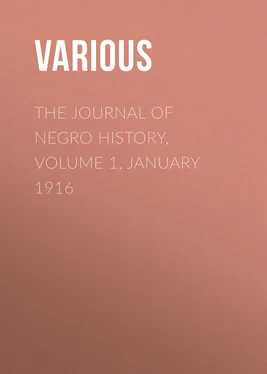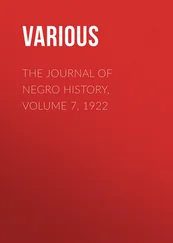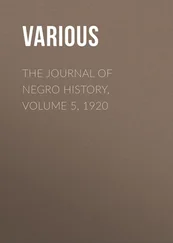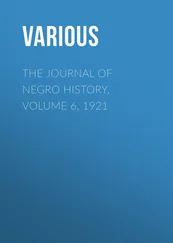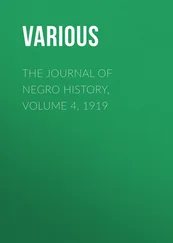Various - The Journal of Negro History, Volume 1, January 1916
Здесь есть возможность читать онлайн «Various - The Journal of Negro History, Volume 1, January 1916» — ознакомительный отрывок электронной книги совершенно бесплатно, а после прочтения отрывка купить полную версию. В некоторых случаях можно слушать аудио, скачать через торрент в формате fb2 и присутствует краткое содержание. Жанр: foreign_antique, periodic, История, foreign_edu, на английском языке. Описание произведения, (предисловие) а так же отзывы посетителей доступны на портале библиотеки ЛибКат.
- Название:The Journal of Negro History, Volume 1, January 1916
- Автор:
- Жанр:
- Год:неизвестен
- ISBN:нет данных
- Рейтинг книги:5 / 5. Голосов: 1
-
Избранное:Добавить в избранное
- Отзывы:
-
Ваша оценка:
- 100
- 1
- 2
- 3
- 4
- 5
The Journal of Negro History, Volume 1, January 1916: краткое содержание, описание и аннотация
Предлагаем к чтению аннотацию, описание, краткое содержание или предисловие (зависит от того, что написал сам автор книги «The Journal of Negro History, Volume 1, January 1916»). Если вы не нашли необходимую информацию о книге — напишите в комментариях, мы постараемся отыскать её.
The Journal of Negro History, Volume 1, January 1916 — читать онлайн ознакомительный отрывок
Ниже представлен текст книги, разбитый по страницам. Система сохранения места последней прочитанной страницы, позволяет с удобством читать онлайн бесплатно книгу «The Journal of Negro History, Volume 1, January 1916», без необходимости каждый раз заново искать на чём Вы остановились. Поставьте закладку, и сможете в любой момент перейти на страницу, на которой закончили чтение.
Интервал:
Закладка:
In 1820 Miss Moore was married to Adolphe Richards, a native of the Island of Guadaloupe. He was a Latin of some Negro blood, had noble ancestry, and had led an honorable career. Educated in London and resident in Guadaloupe, he spoke both English and French fluently. Because of poor health in later years he was directed by his friends to the salubrious climate of Virginia. He settled at Fredericksburg, where he soon became captivated by the charms of the talented Maria Louise Moore. On learning of his marriage, his people and friends marveled that a man of his standing had married a colored woman or a Southern woman at all.
Adjusting himself to this new environment, Mr. Richards opened a shop for wood-turning, painting and glazing. It is highly probable that he learned these trades in the West Indies, but having adequate means to maintain himself, he had not depended on his mechanical skill. In Fredericksburg he had the respect and support of the best white people, passing as one of such well-to-do free Negroes as the Lees, the Cooks, the De Baptistes, who were contractors, and the Williamses, who were contractors and brickmakers. His success was in a large measure due to the good standing of the family of Mrs. Richards and to the wisdom with which she directed this West Indian in his new environment.
They had in all fourteen children, the training of whom was largely the work of the mother. All of them were well grounded in the rudiments of education and given a taste for higher things. In the course of time when the family grew larger the task of educating them grew more arduous. Some of them probably attended the school conducted by a Scotch-Irishman in the home of Richard De Baptiste. When the reaction against the teaching of Negroes effected the closing of the colored schools in Virginia, this one continued clandestinely for many years. Determined to have her children better educated, Mrs. Richards sent one of her sons to a school conducted by Mrs. Beecham, a remarkable English woman, assisted by her daughter. These women were bent on doing what they could to evade the law interpreted as prohibiting any one from either sitting or standing to teach a black to read. They, therefore, gathered the colored children around them while they lay prostrate on the couch to teach them. For further evasion they kept on hand splinters of wood which they had the children dip into a match preparation and use with a flint for ignition to make it appear that they were showing them how to make matches. When this scheme seemed impracticable, one of the boys was sent to Washington in the District of Columbia to attend the school maintained by John F. Cook, a successful educator and founder of the Fifteenth Street Presbyterian Church. This young man was then running the risk of expatriation, for Virginia had in 1838 passed a law, prohibiting the return to that State of those Negroes, who after the prohibition of their education had begun to attend schools in other parts. 66 66 The law was as follows: Be it enacted by the General Assembly that if any free person of color, whether infant or adult, shall go or be sent or carried beyond the limits of this Commonwealth for the purpose of being educated, he or she shall be deemed to have emigrated from the State and it shall not be lawful for him or her to return to the same; and if any such person shall return within the limits of the State contrary to the provisions of this act, he or she being an infant shall be bound out as an apprentice until the age of 21 years, by the overseers of the poor of the county or corporation where he or she may be, and at the expiration of that period, shall be sent out of the State agreeably to the provisions of the laws now in force, or which may hereafter be enacted to prohibit the migration of free persons of color to this State; and if such person be an adult, he or she shall be sent in like manner out of the Commonwealth; and if any persons having been so sent off, shall hereafter return within the State, he or she so offending shall be dealt with and punished in the same manner as is or may be prescribed by law in relating to other persons of color returning to the State after having been sent therefrome. Acts of the General Assembly of Virginia, 1838, p. 76.
It was because of these conditions that in 1851 when her husband died Mrs. Richards sold out her property and set out to find a better home in Detroit, Michigan. Some of the best white people of Fredericksburg commended her for this step, saying that she was too respectable a woman to suffer such humiliation as the reaction had entailed upon persons of her race. 67She was followed by practically all of the best free Negroes of Fredericksburg. Among these were the Lees, the Cooks, the Williamses and the De Baptistes. A few years later this group attracted the Pelham family from Petersburg. They too had tired of seeing their rights gradually taken away and, therefore, transplanted themselves to Detroit.
The attitude of the people of Detroit toward immigrating Negroes had been reflected by the position the people of that section had taken from the time of the earliest settlements. Slavery was prohibited by the Ordinance of 1787. In 1807 there arose a case in which a woman was required to answer for the possession of two slaves. Her contention was that they were slaves on British territory at the time of the surrender of the post in 1796 and that Jay's Treaty assured them to her. Her contention was sustained. 68A few days later a resident of Canada attempted under this ruling to secure the arrest and return of some mulatto and Indian slaves who had escaped from Canada. The court held that slavery did not exist in Michigan except in the case of slaves in the possession of the British settlers within the Northwest Territory July 11, 1796, and that there was no obligation to give up fugitives from a foreign jurisdiction. An effort was made to take the slaves by force but the agent of the owner was tarred and feathered. 69
Generally speaking, Detroit adhered to this position. 70In 1827 there was passed an act providing for the registry of the names of all colored persons, requiring the possession of a certificate showing that they were free and a bond in the sum of $500 for their good behavior. 71This law was obnoxious to the growing sentiment of freedom in Detroit and was not enforced until the Riot of 1833. This uprising was an attack on the Negroes because a courageous group of them had effected the rescue and escape of one Thornton Blackburn and his wife, who had been arrested by the sheriff as alleged fugitives from Kentucky. 72The anti-slavery feeling considerably increased thereafter. The Detroit Anti-Slavery Society was formed in 1837, other societies to secure the relief and escape of slaves quickly followed and still another was organized to find employment and purchase homes for refugees. 73This change of sentiment is further evidenced by the fact that in 1850 it was necessary to call out the three companies of volunteers to quell an incipient riot occasioned by the arrest and attempt to return a runaway slave in accordance with the Fugitive Slave Law. Save the general troubles incident to the draft riots of the Northern cities of 1863, 74Detroit maintained this benevolent attitude toward Negroes seeking refuge.
In this favorable community the Richards colony easily prospered. The Lees well established themselves in their Northern homes and soon won the respect of the community. Most of the members of the Williams family confined themselves to their trade of bricklaying and amassed considerable wealth. One of Mr. Williams's daughters married a well-to-do Waring living then at Wauseon, Ohio; another became the wife of one Chappée, who is now a stenographer in Detroit; and the third united in matrimony with James H. Cole, who became the head of a well-to-do family of Detroit. Then there were the Cooks descending from Lomax B. Cook, a broker of no little business ability. Will Marion Cook, the musician, belongs to this family. The De Baptistes, too, were among the first to get a foothold in this new environment and prospered materially from their experience and knowledge acquired in Fredericksburg as contractors. 75From this group came Richard De Baptiste, who in his day was the most noted colored Baptist preacher in the Northwest. The Pelhams were no less successful in establishing themselves in the economic world. They enjoyed a high reputation in the community and had the sympathy and cooperation of the influential white people in the city. Out of this family came Robert A. Pelham, for years editor of a weekly in Detroit, and from 1901 to the present time an employee of the Federal Government in Washington. 76
Читать дальшеИнтервал:
Закладка:
Похожие книги на «The Journal of Negro History, Volume 1, January 1916»
Представляем Вашему вниманию похожие книги на «The Journal of Negro History, Volume 1, January 1916» списком для выбора. Мы отобрали схожую по названию и смыслу литературу в надежде предоставить читателям больше вариантов отыскать новые, интересные, ещё непрочитанные произведения.
Обсуждение, отзывы о книге «The Journal of Negro History, Volume 1, January 1916» и просто собственные мнения читателей. Оставьте ваши комментарии, напишите, что Вы думаете о произведении, его смысле или главных героях. Укажите что конкретно понравилось, а что нет, и почему Вы так считаете.
